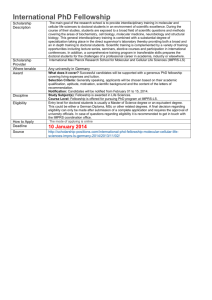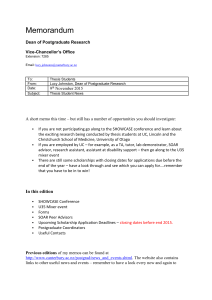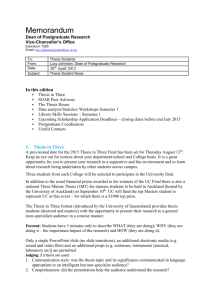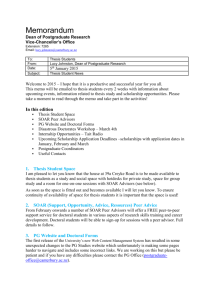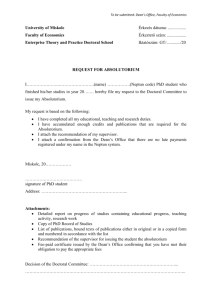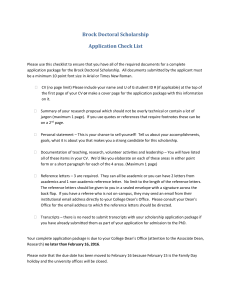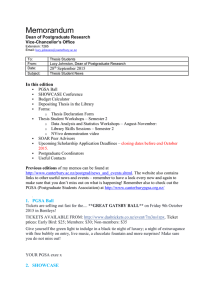4th May 2015 Thesis Student Memo
advertisement
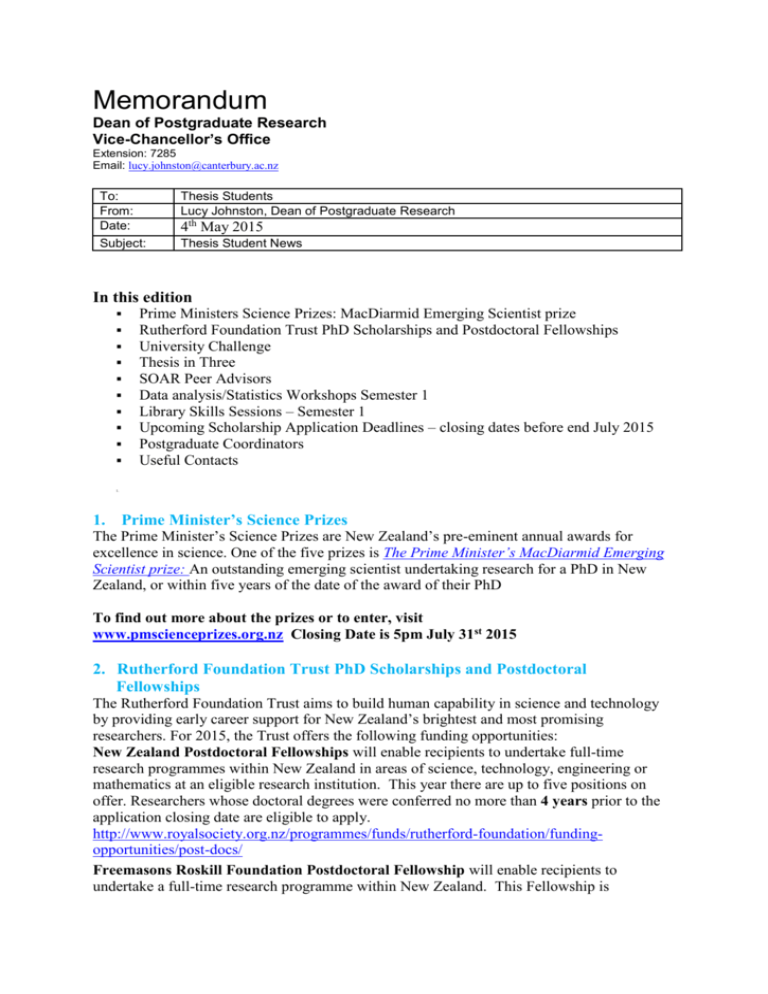
Memorandum Dean of Postgraduate Research Vice-Chancellor’s Office Extension: 7285 Email: lucy.johnston@canterbury.ac.nz To: From: Date: Subject: Thesis Students Lucy Johnston, Dean of Postgraduate Research 4th May 2015 Thesis Student News In this edition Prime Ministers Science Prizes: MacDiarmid Emerging Scientist prize Rutherford Foundation Trust PhD Scholarships and Postdoctoral Fellowships University Challenge Thesis in Three SOAR Peer Advisors Data analysis/Statistics Workshops Semester 1 Library Skills Sessions – Semester 1 Upcoming Scholarship Application Deadlines – closing dates before end July 2015 Postgraduate Coordinators Useful Contacts 1. 1. Prime Minister’s Science Prizes The Prime Minister’s Science Prizes are New Zealand’s pre-eminent annual awards for excellence in science. One of the five prizes is The Prime Minister’s MacDiarmid Emerging Scientist prize: An outstanding emerging scientist undertaking research for a PhD in New Zealand, or within five years of the date of the award of their PhD To find out more about the prizes or to enter, visit www.pmscienceprizes.org.nz Closing Date is 5pm July 31st 2015 2. Rutherford Foundation Trust PhD Scholarships and Postdoctoral Fellowships The Rutherford Foundation Trust aims to build human capability in science and technology by providing early career support for New Zealand’s brightest and most promising researchers. For 2015, the Trust offers the following funding opportunities: New Zealand Postdoctoral Fellowships will enable recipients to undertake full-time research programmes within New Zealand in areas of science, technology, engineering or mathematics at an eligible research institution. This year there are up to five positions on offer. Researchers whose doctoral degrees were conferred no more than 4 years prior to the application closing date are eligible to apply. http://www.royalsociety.org.nz/programmes/funds/rutherford-foundation/fundingopportunities/post-docs/ Freemasons Roskill Foundation Postdoctoral Fellowship will enable recipients to undertake a full-time research programme within New Zealand. This Fellowship is concerned with advancing knowledge in areas that are related to ageing and this year there is one position on offer. Researchers whose doctoral degrees were conferred no more than 3 years prior to the application closing date are eligible to apply. http://www.royalsociety.org.nz/programmes/funds/rutherford-foundation/fundingopportunities/freemasons/ Cambridge-Rutherford Memorial PhD Scholarships are jointly funded by the Rutherford Foundation Trust and the Cambridge Commonwealth, European and International Trust. These Scholarships are intended to provide full support to enable completion of a PhD at the University of Cambridge in pure or applied science. http://www.royalsociety.org.nz/programmes/funds/rutherford-foundation/fundingopportunities/phd-scholarships/ International PhD Scholarship (a grant-in-aid) will contribute towards a student’s fulltime study for a PhD in any area of science, technology, engineering or mathematics at an eligible host research institution. The award intends to provide a financial contribution towards the support of a PhD scholar at a prestigious international research institution in their chosen field of study. The Scholarship is not intended to cover all of the costs associated with studying towards a PhD abroad. Applicants are expected to negotiate with the host research institution or other charitable funding organisations to reduce course fees or provide additional financial support to cover any shortfall in funding. http://www.royalsociety.org.nz/programmes/funds/rutherford-foundation/fundingopportunities/international-phd/ Instructions for how to register and use the Proposals on-line portal can be found on the Rutherford Foundation website http://www.royalsociety.org.nz/programmes/funds/rutherford-foundation/fundingopportunities/ 3. University Challenge – audition to be on TV!! University Challenge is a game show in which eight universities from around the country compete in a knowledge-based quiz. The game show is filmed and broadcasted on mainstream television. Four players from each university compete against the other universities with a reserve player from each team, who acts as the team manager and substitute player. The University of Canterbury won the last Challenge so we looking to back it up. The Information and Preliminary Quiz is being held on the 14th of May at 5:30pm in Laws108 Lecture Theatre. Those interested in being part of the team will take part in a timelimited 100 question Quiz. The top 10 scoring candidates will have an interview, and from there 5 students will selected for the team. The competition is filmed and held at a film studio in Invercargill so will you need be available between the 23rd to the 29th of August. Flights, accommodation and food is all paid for. For more information go to http://ucsa.org.nz/UniChallenge/ or email James Addington at postgraduate@ucsa.org.nz 4. Thesis in Three The 2015 Thesis in Three Final will be on Thursday August 13th. Keep an eye out for notices about your department/school and College heats. It is a great opportunity for you to present your research in a supportive and fun environment and to learn about research being undertaken by other students across campus. Three students from each College will be selected to participate in the University final. Format: Students have 3 minutes only to describe WHAT (they are doing); WHY (they are doing it – the importance/impact of the research) and HOW (they are doing it). Only a single PowerPoint slide (no slide transitions), no additional electronic media (e.g. sound and video files) and no additional props (e.g. costumes, instruments [musical, laboratory etc]) are permitted Judging: 3 criteria are used: 1. Communication style: was the thesis topic and its significance communicated in language appropriate to an intelligent but non-specialist audience? 2. Comprehension: did the presentation help the audience understand the research? 3. Engagement: did the presentation make the audience want to know more? 5. SOAR Peer Advisors The advisors are senior PhD candidates from across campus and each can offer support on a variety of different topics related to doctoral study. For further information and to book an appointment go to http://www.canterbury.ac.nz/postgrad/soar_peer_advisors.shtml. I encourage doctoral students to use this free service to get additional support and advice related to your studies!! The sessions will be held in the Thesis Student House (39A Creyke Road). 6. Data Analysis and Statistics Workshops Semester 1 A series of workshops are being offered in Semester 1 as detailed below. The sessions are to be run by Dr Elena Moltchanova and Dr Daniel Gerhard from the Statistical Consulting Unit (School of Mathematics and Statistics). If you have signed up for a session please let us know if you cannot attend! A flyer with abstracts for each session is provided at the end of this memo. Please ensure that you register for each session that you wish to attend by following the link after each abstract. There is no limit on attendance at the seminars but there are for the lab. Streams are limited to 20 people per stream – if you sign up and are subsequently unable to attend please ensure that you let me know ASAP so that I can open the place up to another student. Session Type Date/Time/Room Generalised linear regression and ANOVA Seminar (1hr) + lab (1 hr) Bayesian modelling: Introduction to WinBUGS software Seminar (1hr) + lab (1 hr) Thursday May 28; 204pm Seminar – Room 103, Wheki Building, Dovedale Campus Labs – Rooms 101 and 103 Kotuku, Dovedale Campus Thursday June 18; 2-4pm Seminar – Room 103, Wheki Building, Dovedale Campus Labs – Rooms 101 and 103 Kotuku, Dovedale Campus 7. Library Skills Sessions The Library is offering a number of workshops on various research tools for students in Semester 1. More information and the registration form can be found at: http://library.canterbury.ac.nz/webapps/public/course.php#Research_Support May Introduction to Endnote Keeping Current using RSS June Introduction to Research Data Management 6-May-15 11:00am 14-May-15 11:00am 30-Jun-15 10:30am 50 50 Central Library Den Central Library Den 90 Central Library Room 210 8. Upcoming Scholarship Deadlines Listed below are scholarships with a closing deadline approaching. Please consult the Scholarships website for details, eligibility and closing dates and information about other scholarships http://www.canterbury.ac.nz/scholarships/ Betty Wignall Scholarship in Chemistry Eligibility: PhD students of Chemistry Closing Date: 15 May 2015 Canterbury Scholarship Eligibility: Doctoral studies Closing Date: 15 May 2015 Royal Commonwealth Society, Canterbury Scholarship Eligibility: Commonweath master's and PhD students Closing Date: 15 May 2015 UC Doctoral Scholarship Eligibility: Doctoral students Closing Date: 15 May 2015 UC International Doctoral Scholarship Eligibility: Doctoral studies Closing Date: 15 May 2015 UC Master's Scholarship Eligibility: Master's students Closing Date: 15 May 2015 UC Matariki Doctoral Scholarship Eligibility: Maori research-doctoral students Closing Date: 15 May 2015 UC Pasifika Doctoral Scholarship Eligibility: Pasific Island research-doctoral students Closing Date: 15 May 2015 Auckland Council Chief Economist's Research Scholarship in Economics Eligibility: Postgraduate students in urban economics or related field Closing Date: 30 May 2015 Lighthouse Vision Trust Susan Barnes Memorial Scholarship Eligibility: Enrolled students with low vision Closing Date: 31 May 2015 Murray and Company Investment Banking Scholarship Eligibility: Students wishing to pursue a career in finance Closing Date: 31 May 2015 Canterbury Chemeca Trust Fund Eligibility: Assistance for conferences and workshops Closing Date: 30 Jun 2015 Vice Chancellor's Excellence Award Eligibility: Full-time domestic undergraduate students and full-time domestic doctoral students Closing Date: 13 Jul 2015 NZIDRS New Zealand International Doctoral Research Scholarship Eligibility: International (not Fijian) PhD students Closing Date: 15 Jul 2015 9. Postgraduate Coordinators and other contacts The following is a list of the Faculty Deans, College Academic Managers, College PG Committee Representative and the Postgraduate Coordinators in each department/school. PG students should feel comfortable to approach these people with any questions or comments regarding thesis work. FACULTY DEANS AND ACADEMIC MANAGERS Faculty of Engineering and Forestry: Professor Conan Fee (Dean); Lisa Carter (Academic Manager) Faculties of Arts: Dr Jonathan Le Cocq (Dean); Associate Professor Lyndon Fraser (Associate Dean – Postgraduate); Liz Bond (Academic Manager); Azeen Tashakkor (Student Advisor) Faculty of Science: Associate Professor Catherine Moran (Dean); Tracey Robinson (Senior Academic Advisor) Faculty of Education: Dr Julie Mackey (Dean); Marion Macneil (Academic Manager) Faculty of Commerce: Dr Ross James (Dean); Annette Wanty (PA to the Dean) Faculty of Law: Associate Professor John Hopkins (Associate Dean); Heather Couch (School Administrator) COLLEGE PG COMMITTEE REPRESENTATIVES College of Engineering: Associate Professor Philippa Martin (Electrical and Computer Engineering) College of Arts: Associate Professor Lyndon Fraser (Sociology) College of Science: Dr Sarah Masters (Chemistry) College of Education: Professor Lindsey Conner (Educational Development and Leadership) College of Business & Law: Professor Karen Scott (Law) POSTGRADUATE COORDINATORS ACIS: Associate Professor Annick Masselot SCHOOL OF HUMANITIES AND CREATIVE ARTS: Associate Professor Peter Field ART HISTORY & THEORY Dr Barbara Garrie CINEMA: Dr Mary Wiles DIGITAL HUMANITIES: Dr James Smithies CLASSICS: Dr Patrick O’Sullivan ENGLISH: Dr Christina Stachurski HISTORY: Dr Jane Buckingham PHILOSOPHY: Professor Jack Copeland FINE ARTS: Associate Professor Aaron Kreisler MUSIC: Associate Professor Glenda Keam THEATRE AND FILM STUDIES: Associate Professor Peter Falkenberg LSAP: HUMAN SERVICES: Associate Professor Kate van Heugten LANGUAGES AND CULTURES: Professor Henrietta Mondry LINGUISTICS: Professor Jen Hay MEDIA & COMMUNICATION and JOURNALISM: Dr Babak Bahador EUROPEAN STUDIES: Professor Martin Holland POLITICAL SCIENCE: Dr Scott Walker SOCIAL WORK: Dr Jane Maidment SOCIOLOGY and ANTHROPOLGY: Dr Anne Scott BIOCHEMISTRY: Professor Ian Shaw BIOLOGICAL SCIENCES: Dr Ashley Garrill ENVIRONMENTAL SCIENCE: Dr Sally Gaw CHEMICAL ENGINEERING: Dr Aaron Marshall CHEMISTRY: Dr Sarah Masters CHILD & FAMILY PSYCHOLOGY: Dr Karyn France CIVIL ENGINEERING: Dr Ricardo Bello-Mendoza COMMUNICATION DISORDERS: Dr Rebecca Kelly-Campbell (Audiology); Dr Maggie-Lee Huckabee (Speech and Language Pathology) COMPUTER SCIENCE: Professor Andy Cockburn COUNSELLING: Dr Judi Miller ECONOMICS & FINANCE: Associate Professor Alfred Guender (Economics); Professor Glenn Boyle (Finance) EDUCATIONAL STUDIES AND LEADERSHIP: Professor Lindsey Conner (Doctoral); Trish McMenamin (MEd) ELECTRICAL AND COMPUTER ENGINEERING: Associate Professor Phillipa Martin (PhD); Dr Chris Hann (ME) FORESTRY: Professor David Norton and Jeanette Allen GATEWAY ANTARCTICA: Professor Bryan Storey GEOGRAPHY: Dr Deidre Hart (PhD); Dr Femke Reitsma (Masters) GEOLOGY: Dr Ben Kennedy (PhD); Dr Stefan Winkler (MSc) HEALTH SCIENCES: Dr Arindam Basu (Masters); Professor Ann Richardson (PhD) HIT Lab: Dr Christoph Bartneck LAW: Professor Karen Scott MANAGEMENT: Dr Sarah Wright MAORI: Associate Professor Jeanette King MATHS & STATS: Dr Miguel Moyers-Gonzalez MECHANICAL ENGINEERING: Dr Sid Becker and Associate Professor Mark Jermy PACIFIC STUDIES: Associate Professor Lyndon Fraser PHYSICS & ASTRONOMY: Dr Jon-Paul Wells PSYCHOLOGY: Associate Professor Roeline Kuijer SPORT AND PHYSICAL EDUCATION: Associate Professor Jeanne Kentel (doctoral); Trish McMenamin (MEd) TEACHER EDUCATION: Dr Brigid McNeill (Doctoral); Trish McMenamin (MEd) 10. Useful contacts Postgraduate Enrolment and Fees: (thesis-enrolment@canterbury.ac.nz) Scholarship issues: Scholarships Office (scholarships@canterbury.ac.nz) Student support and advice: Student Advisors, Room 214 James Hight Library (9:00-4:30). After hours 0800 823 637 Postgraduate Students Association (PGSA): info@canterburypgsa.org.nz or www.canterburypgsa.org.nz Careers, Internships & Employment - careers@canterbury.ac.nz Support for Maori Postgraduate Students – see http://www.canterbury.ac.nz/maoristudents/support/postgraduate.shtml Support for Pacific students – see http://www.canterbury.ac.nz/pacificstudents/ UCSA Welfare and Advocacy: advocacy@ucsa.canterbury.ac.nz or call 03 364 2652 x 3910 to make an appointment UCSA Help (Students can come in with any issues they may be facing that have the potential to impact their studies) Food Bank (Students can access the food bank once per term when struggling financially) Hardship Grant (Unforeseen costs that may impact on their studies at UC) Student Advocate (Supporting students to navigate the University administration system) Emergency Dental Scheme (Students that are in acute pain and cannot afford to access treatment) UCSA Dental Clinic (Basic dental care – check-ups, x-rays, fillings, extractions) Budgeting Advice (Teaching students to live on a low income and tools for their future) Mickle Fund (An interest-free loan available for students with large accommodation costs or postgraduate students struggling financially) PhD Student Mentoring Scheme: Jane Hall (jane.hall@canterbury.ac.nz) Statistics/Data Analysis Workshops 2015 SESSION DETAILS: 1. Experimental Design and Planning statistical analysis for your thesis (2h, including questions) It is a common misconception, that experimental design is all about data collection and that there is no serious need to think about statistical analysis before one actually has the data. During this seminar we will talk about the importance of correctly formulated research question, and how it largely determines both, the data required and the method of analysis. We will also discuss sample size and power calculation, some issues with survey planning, and the meaning of randomization and stratification of a sample in some real-life situations. Ample time will be left for questions. 2. Basic statistical concepts, tests and exploratory data analysis. (1h seminar; 1 hr lab – SPSS/R) What does ‘random’ sample really mean? How can one get to know the data? How is sample mean different from expected value and what is the difference between standard error and standard deviation? Can we ever accept the null hypothesis? Is Kruskal-Wallis the same as basic one-way ANOVA? A review of basic statistical concepts and tests, which are necessary to understand more complex methods. The lab will provide an introduction to the software and is therefore particularly recommended if you have not previous experience of R/SPSS. Register here to attend one of the lab streams 3. Linear regression analysis and ANOVA (1h + 1h lab in SPSS/R) Multiple regression and ANOVA are among the most frequently applied statistical methods. In this seminar we will go through the four steps of the regression modelling: (i) exploratory data analysis, (ii) model fitting, (iii) diagnostics, and (iv) interpretation of results. Model selection within ANOVA framework will also be considered. Register here to attend one of the lab streams 4. Generalised linear regression and ANOVA (1h+1h lab in SPSS/R) Logistic linear regression is a special case of generalised linear modelling, when the response is binary, i.e. ‘sick/healthy’, ‘improved/did not improve’, ‘yes/no’ ,’species 1/species 2’ etc. It is frequently used in many fields. We will discuss various aspects of logistic regression fitting, paying special attention to the concepts of odds-ratios and interpretation of results. We will also briefly consider Poisson responses, i.e. counts such as ‘how many people came to class’ or ‘how many traffic accidents happen each day’. Participation in this session assumes familiarity with the principles of regression analysis and ANOVA. (see previous seminar). Register here to attend one of the lab streams 5. Bayesian modelling (1h+1h lab in WinBUGS) There is more to statistics then frequencies and maximum likelihood estimation. In 1750s, Rev. Thomas Bayes started developing a theorem which became the basis for a whole new way of doing statistics. In the last three decades, Bayesian statistics has become widely used thanks to the improvements in computing and to WinBUGS – free and relatively user-friendly software for Bayesian inference. In the seminar, we will briefly go through the principles of the Bayesian statistics and some examples of its applications in practice. Special attention will be given to the situations where classical statistics does not quite work. Register here to attend one of the lab streams
